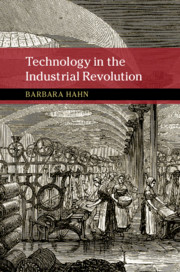‘Barbara Hahn boldly reframes the story of the profound economic, social, and cultural changes that transformed northern England between the 1760s and the 1840s. By emphasizing networks and systems rather than men and machines she forces us to see the world of the Industrial Revolution anew. We are all in Hahn’s debt for this splendid new study.’
Peter A. Coclanis - University of North Carolina, Chapel Hill
‘In this exciting introduction to the Industrial Revolution, Barbara Hahn lucidly and elegantly shows that multiple contexts - local, regional and global - shaped the development of technology in Britain. A perfect text for undergraduates.’
Prasannan Parthasarathi - Boston College
‘A much-needed, long-awaited, and deeply engaging contribution to our difficult conversations about the 'Industrial Revolution'. Barbara Hahn provides a masterful account of peoples, machines, productions, consumptions, cultures, and the state, weaving together very local, very global, traditional, revisionist, and contested stories. We are lucky to have this book available now.’
Heidi Voskuhl - University of Pennsylvania
‘… expansive … edifying … develops a highly nuanced view that encompasses innovation, politics, economics, and the transnational context in which this transformative process occurred.’
B. C. Odom
Source: Choice
‘This book proposes an excellent and updated approach to the history of the industrial revolution for undergraduate students and for anyone else who wants an intelligent introduction to this topic.’
Laurent Heyberger
Source: Metascience
‘… it is a well-written and accomplished account of technological change in a sector that often stands as proxy for the Industrial Revolution.’
Chris Evans
Source: Technology and Culture
‘… this book … succeeds fully in giving a clear, complex, and nuanced introduction to the history of industrialization, which is contextualized in an imperial context and portrayed as global process. The text offers a presentation particularly suitable for undergraduates, providing all the expected landmarks, with short readings listed for each chapter (in addition to the final bibliography). But for the research field in general, it also brings about a short and useful synthesis of the historiographical debates on industrialization, a concept itself analyzed, subject to ideological contestation, and the object of numerous appropriations and investigations.’
Madeleine Forrest
Source: H-Nationalism
‘This is an excellent book and a welcome addition to the literature.’
David N. Lucsko
Source: Agricultural History



